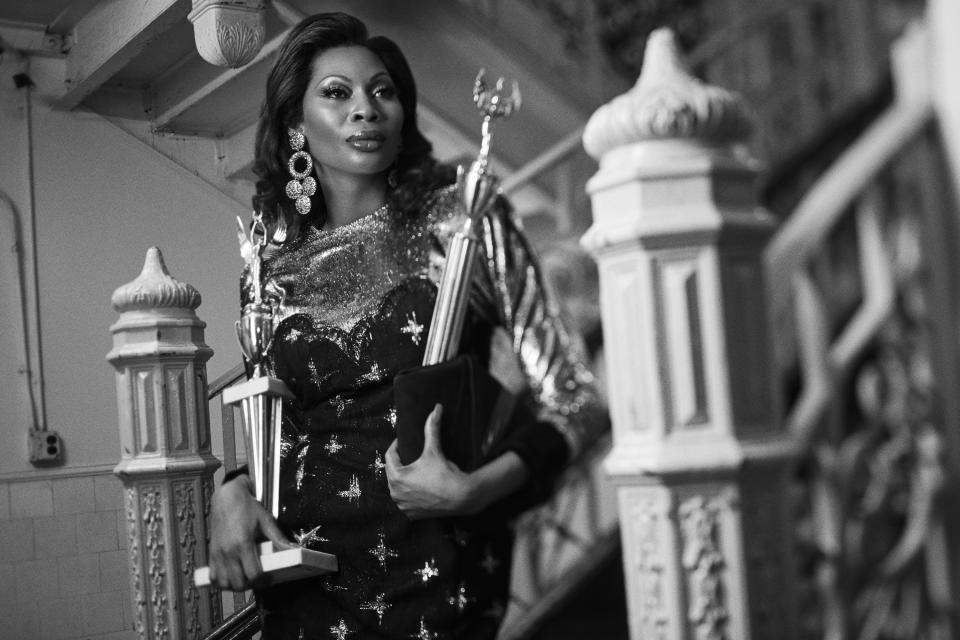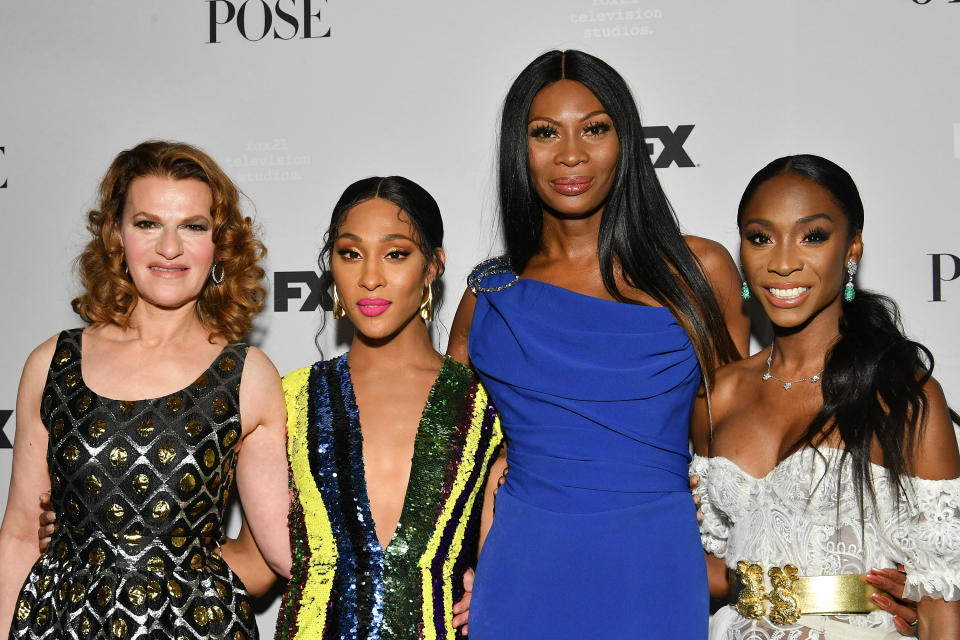Dominique Jackson of 'Pose' on LGBTQ Pride and culture: 'Trans women have always been the nurturers'
When FX’s Pose first burst onto the pop culture scene, there were many forces pushing it into people’s hearts and minds — one being the whirlwind that is Dominique Jackson. As the diva house mother Elektra Abundance, Jackson brings to the small screen a disarming blend of cruelty and vulnerability, laced with nonstop doses of glamour and ferocity.
“Sometimes you find resonance in the character,” Jackson, who will also serve as one of the grand marshals for New York City’s Gay Pride March on June 30, tells Yahoo Lifestyle during a recent interview at the glam 701 West restaurant at the Edition hotel in Times Square.
“Elektra’s a woman that is assertive, she’s strong, she struggled to get where she is and she will continue to do so,” she says. “And that possibly means that she’s not going to coddle her children.” And that, as anyone hooked on the series knows, is a serious understatement.
Jackson has been on overdrive this month, shooting the last of Pose season two, which kicked off on June 11 and was just renewed for a third season, and recently serving as grand marshal for Capitol Pride, in Washington, D.C. At the helm of NYC’s march, she’ll be joined by Pose costars Mj Rodriguez and Indya Moore.

The stunning star, also known as Tyra Allure Ross, is also a model (seen on the Oxygen reality series Strut in 2016) and author (her memoir is The Transsexual from Tobago). And she has pretty much blown up since joining the cast of Pose — which delves into stories of 1980s NYC ball culture and the queer chosen families, or “houses,” that its participants form, as first brought into mainstream consciousness through Jennie Livingston’s 1990 documentary Paris Is Burning.
When it was first announced in late 2017, Pose made headlines for a rare television feat: featuring the largest cast of transgender actors in series regular roles. Jackson was among them, and says the importance of that is never far from her mind.
“It's scary as hell to be in this position right now,” she admits, despite having “prayed” for an opportunity like this. “I did not realize how many people would not be happy with my success,” Jackson adds.
“I have to continue to realize that there’s a greater picture. And it’s about all those people out there who are now like I was when I was looking at television and seeing Madonna’s ‘Vogue’ and [ball legends and vogue stars] Hector [Xtravaganza] and Jose [Gutierrez Xtravaganza] and thinking, oh, wait a minute, life can be different.”
But, she adds, “it’s not just me,” before rattling off a list of others who have contributed to either the visibility or wellbeing of transgender people, and who have been doing the work for years. “So it’s not about what I have brought to Elektra, it’s about a community that has opened up, and has been fighting so hard that a character like Elektra was possible.”
Many of her heroes were born out of ball culture — as was Jackson herself, after emigrating to the U.S. from Tobago as an 18-year-old trying to find herself, and stumbling onto the scene in Baltimore, Maryland.
“Ball culture saved my life, and many people don’t understand that,” she explains. “But ballroom is where I found chosen and proven family. Ballroom is what gave me the strength to be able to be strong enough to go back to my family and try to reclaim what was lost. So, I am not just someone playing a part. I’m someone that has lived this part.”
And that includes having had various mothers, such as the one she plays on TV, throughout her life. Jackson gets a bit choked up when recalling her very first mother, Shatira Revlon, who noticed Jackson in downtown Baltimore “trying to be fast and get into stuff.”

“She came up to me and said I was going to hurt myself if I kept dating the person who I was attempting to date…” she recalls. “She walked up to me that day and held my hand and said to me, ‘I will not see you go down this path.’ And I had no idea who she was. I looked at her like, ‘I don’t know you and you’re blocking me!’ God bless her soul. Years later I realized that she saved my life, so ballroom saved my life. It was because of the ballroom culture that I’m able to stand before you.”
The culture of LGBTQ people watching out for and nurturing each other still saves lives. And the hope is that the pop-culture representation of it, through shows like Pose, will make a healthy impact, too — especially in light of the fact that transgender women of color still face high rates of discrimination and violence, despite having, in many ways, led the fight for LGBTQ equality, starting way before the Stonewall uprising 50 years ago.
“So, when we talk about Pride and Stonewall and the movement,” she says, “let’s remember this was not a ‘riot’ [as it is often referred to], it was a rebellion,” in response to a masquerading ordinance that said everyone had to wear at least one item of clothing that corresponded to his or her birth sex.
“And these women were done with that — and 50 years later, we’re getting the recognition, because it was taken from us,” Jackson says. “Trans men and women have always been thrown to the sides, but …have always been the nurturers, especially trans women… because what happens is we take [people] in and we show them love, no matter what they do to us afterwards”
Jackson’s vulnerability in the world is one that’s not lost on her. “Every time that I wake up and I come out here and I do interviews and I talk to people, I don’t know if I’m going back home,“ she says, a reference to the recent murders or black trans women.
“The only way we can change any of these things — the murders, the violence against trans women — is through education,” she says. “People have to realize that it is not OK to hurt another human being. And that is what we forget.”
Read more from Yahoo Lifestyle:
Victoria’s Secret faces backlash for tweeting in support of LGBTQ community: ‘What hypocrisy’
Follow us on Instagram, Facebook, Twitter and Pinterest for nonstop inspiration delivered fresh to your feed, every day.
